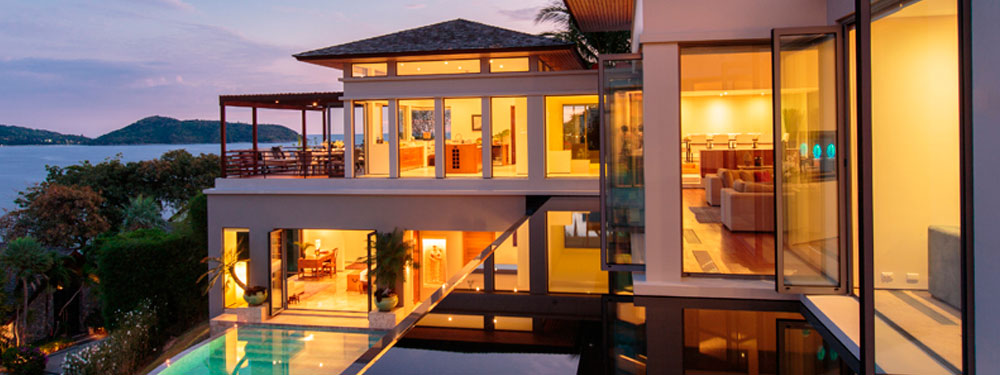Securing a better future with sustainable building
When O.B Wetzell and his wife decided to move to Thailand, the reason was quite simple: they wanted to start a family. Somewhere like Phuket seemed a lot more exotic and exciting than anywhere in America. However, the move proved to be one of the best decisions he would make, not only for his family but for the future of sustainable building in Thailand as well.
A builder all his life, and now the Managing Director of Development Management Group (DMG) in Phuket, Wetzell accepted a job building luxury holiday villas at the time the Amanpuri project started. The project is famous for pioneering the concept of small, exclusive resorts designed to complement the many beautiful locations in Thailand.
“It was the single best piece of iconic business matrix the hospitality industry had ever seen,” Wetzell says. “We eventually built 125 high-end villas, as well as working on resorts through Thailand and the Maldives, which is how I became a project manager.”
Introducing green building to Thailand
While he was still working in America, Wetzell gained a lot of experience in building sustainability while looking at environmentally sensitive infrastructure. “At that time we [builders] had an owner builder code which allowed us to experiment with our own building styles,” says Wetzell. “Then Leadership in Energy and Environmental Design (LEED) came along.”
LEED is considered as one the most popular green building certification programs used globally. It provides building owners and operators a framework for identifying and implementing practical n measurable green building design, construction, operations and maintenance solutions.
Wetzell’s current project, a Rosewood Resort, will be the first LEED gold resort in South East Asia. “However, building six star luxury is very difficult,” Wetzell says. “Introducing the appropriate technologies while showing environmental sensitivity is insanely difficult.” The only LEED constructions in Thailand at the moment are buildings such as tower hotels. “[Even so] my team and I enjoy the challenge, and we thank the visionaries at Rosewood for [their] pursuit of sustainability. Environmentally friendly hospitality buildings enjoy huge savings which accrue from lower running costs. The good news is that it sells. Tourists are getting more and more sustainable themselves, and they are willing to pay for six star accommodations that are LEED gold certified.”
How ready is Thailand for sustainable building?
“I believe Thailand must be a leader [in sustainability],” says Wetzell. “It would be huge for the country. China has hectares of solar panels but they also pollute a lot of the air and water, which is tragic. Thailand’s government has been addressing the environmental problem by offering a 20% goal by 2036 of clean energy products. They are also incentivizing the goal by buying power from businesses that uses solar panels.”
At first glance, building Thailand’s infrastructure in a sustainable manner seems financially irresponsible. As Wetzell himself says, politicians and businessmen only hear numbers when a pitch to go green is made. However, solar panels now pay themselves off in four years, where previously it would have taken eight to ten years.
“[Switching to a sustainable mind-set] at a business level is huge,” says Wetzell. “Essentially, that’s the goal for the entire industry. The bottom line is that sustainability is a good thing, and we have to show that.”
One of the reasons Wetzell is passionate about sustainability is because he doesn’t want to leave an “environmental mess” for his children and grandchildren. “That is the challenge globally in every business sector and the hospitality sector can be very avant garde,” he says.
Many studies have shown that South East Asia will be impacted more than other locations in terms of global warming which is why, as Wetzell puts it, “we have to future proof against deteriorating water, air and food quality. We have to invest sustainably towards a better environment and lower energy consumption.” Sustainable building is one way to make sure future generations don’t inherit what we destroyed.
As for DMG, Wetzell’s idea is that his company continues their work and start putting up their own developments. He can then focus on sustainability and future proofing.
Why is Thailand the future of sustainable building?
“Asia is the epicentre of tomorrow’s economy, there’s no question [regarding that],” says Wetzell. “Thailand is a much more manageable sustainability model. We are currently doing a reef restoration at a resort in Phuket and the army arrived to clean up the beaches. Thanks to the government we have noticed less corruption and the beaches are cleaner now than they have been in a long time, which is a great step forward.”
Wetzell adds that, apart from the country being perfectly located for the future of sustainable building, it’s a great place to raise a family “with some degree of security and lovely hospitable people”.
“I would encourage people to understand Thailand historically, meaning it is stable. What westerners often don’t understand is the Thai people’s reverence for the Royal Family. That’s the solidity that holds Thailand together. The strength of Buddhism and of multi cultures is demonstrated in Thailand.”
